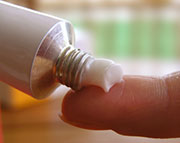- Double Mastectomy May Offer No Survival Benefit to Women With Breast Cancer
- Toxic Lead Found in Cinnamon Product, FDA Says
- Certain Abbott Blood Sugar Monitors May Give Incorrect Readings
- Athletes Can Expect High Ozone, Pollen Counts for Paris Olympics
- Fake Oxycontin Pills Widespread and Potentially Deadly: Report
- Shingles Vaccine Could Lower Dementia Risk
- Your Odds for Accidental Gun Death Rise Greatly in Certain States
- Kids From Poorer Families Less Likely to Survive Cancer
- Tough Workouts Won’t Trigger Cardiac Arrest in Folks With Long QT Syndrome
- At-Home Colon Cancer Test Can Save Lives
Coping Tips for Winter Skin


The cold, dry air of winter can deplete your skin of moisture and cause “winter itch.”
But you can take steps to protect your skin and prevent that itchy feeling, according to Dr. Robyn Gmyrek, a dermatologist and director of the Skin and Laser Center at NewYork-Presbyterian/Columbia University Medical Center.
Moisturize daily with petrolatum- or cream-based moisturizers, Gmyrek said. Apply them directly to your wet skin after a bath or shower so that the moisturizer can help trap surface moisture. For sensitive skin, choose a moisturizer without fragrance or lanolin.
Clean your skin, but don’t overdo. Too much cleansing depletes the skin’s natural moisturizers, Gmyrek explained. Washing your face, hands, feet and between the folds of your skin once a day is enough. You can rinse your trunk, arms and legs daily, but you don’t have to use soap or cleanser on these areas every day.
Limit your use of hot water and soap. If you do have winter itch, take short, lukewarm showers or baths with a cleanser that is non-irritating and non-detergent-based. Apply a thick cream or a petroleum-jelly-type moisturizer right away, and then gently pat skin dry, Gmyrek said.
Room humidifiers can help prevent indoor air from becoming too dry, she added. When you’re outside, protect your skin from wind, extreme cold and sun. Don’t use tanning beds or artificial sunlamps, which can damage your skin and increase your risk of skin cancer.
See a dermatologist if you have persistent dry skin, scaling, itching or skin growths that concern you. This applies throughout the year, not just during winter, Gmyrek said.
More information
The American Osteopathic College of Dermatology has more about dry skin.
Source: HealthDay
Copyright © 2024 HealthDay. All rights reserved.










